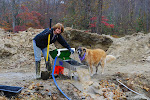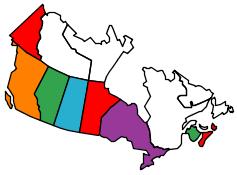A few posts and quite a few stops back, we explored the Center Of The Universe. That, as we found out, is pretty darn soft. But what about being the center of attention? That, it seems, is pretty darn hard. If the president is asked to give a graduation address at, say, Notre Dame, for example- he is going to be the center of attention and have to deal with the tough issues of the day. If an unwed woman gives birth to 8 kids (and it's an otherwise normal news cycle) she is going to be the center of attention and have to deal with whatever it is she did and whatever it is everyone thinks about what she did. If I find the biggest nugget of the year in the gold camp, I'm going to be the center of attention. But that's easy, isn't it? All good. But what if I spent a couple days fixing my frozen coach steps on a trip north, finally get my electric motor on my step cover working again, spend an entire "day off" hunched over under the coach trying to fix a diesel furnace I know very little about and NEED desperately) and then decide near the end of the day I need a nap? What about if some yahoo (not the web site) drives his Fifth Wheel into the front of my parked-for-the-night 4x4 van and staves in the front quarter and clips the passenger side mirror while I am sleeping. Should I become the center of attention for that? The answer is: In a campground- yes! The guy who smacked you had an "accident." Or was an ignoramus- your choice. But the guy who was hit? He gets to be the center of attention. Everyone comes to see for themselves. Even if they sat in their rig and watched the whole thing happen. Same thing with the guy who has a flat in the morning. Or the guy who pops his hood to check the oil, but everyone else assumes has "a problem..." Campers love other campers with problems. The very reason that Robin Williams RV Movie was such a hit. They think this way (I THINK) because they are just happy it is not them. A problem "on the road" is often far worse than a problem at a fixed place of residence. There you have a support staff, a phone book, telephone service is almost guaranteed, and you can call a buddy if you are really in a jam. The dealer will give you a loaner car, yes? On the road, you first need to declare, "Oh, sh_t", panic for at least a full 6o seconds, then go off to find a phone book, a support staff, and someone who may be able to help in some way, but who is gonna be gone in the morning regardless of what you have left to deal with. In the Yukon Territory, the police are called the Mounties. Maybe they rescue damsels in distress like Dudley Doright did with Little Nell, but a motorist is of no concern whatsoever unless he is bleeding on the shoulder of the road, in which case they will come out for a look. But if a guy from, say, Texas, hits a guy from , say, Florida, they can't be bothered. If you wish to come to them, well OK, but otherwise, deal with it! If you can't drive your vehicle to them, apparently that is not their concern either. I found that to be less than helpful all around, but what do I know? Push here. Shove there. Tape all around...and roll out of camp in the morning. No longer the center of attention. And glad of it.
So now with a wounded bird flying in tow behind the coach, we head toward what we know will be the nastiest piece of road the Alaska Highway can dish up- the stretch from Whitehorse to Destruction Bay. Destruction Bay. First established as a relay stop for construction materials and crews for the building of this highway. A place where the trucks, IF they made it this far, could pull in for repair. It got its name from a storm that blew through and wiped out nearly everything that had been set up. But oddly enough, the name now is more apparently related to what it will do to your vehicle as you drive through. This is an area of extreme perma frost. The heaves, the holes, the graveled broken road now becomes the center of attention for this part of the trip. You THOUGHT as you headed for Lake Kluane that the mountains (the largest non polar ice field in North America) or the lake itself (the largest lake in the Yukon Territory) might just be the center of attention. And then you feel the gravel, and the washboard slows your vehicle to 8 miles an hour- that is, if you want the parts of your vehicle to stay fastened to each other. If you stop and scan the mountain before you as you come down to the lake, you will realize that those white specks on the mountain are Dall Sheep. We stopped counting at 150 sheep, thereby making them the center of attention for a brief moment in time, until we started rolling again. Destruction Bay is where we are camped overnight- about half the rough patches behind us. We know there is more up ahead described to us by some who have traveled it recently as "holes in patches." For what its' worth, if you are following behind this trip, seems to us like the 22 miles of destruction we ran two years ago is reduced down to 10 this year. A step in the right direction for sure. And even the parts that are still bad, have so far not been as bad as they were then. I hope I don't have to eat those words. 'Cause, wouldn't that make me the center of attention again?











5 comments:
I love seeing the road as part of the scenery. It gives us a very good feel of the trip. I am emjoying your blog.
Gene S.
Thanks Gene. The road is often NOT the center of attention. On this trip - it is certainly that...or a big part of it!
Your details on road conditions I extremely helpful since I'm a couple weeks behind you. Taking lots of notes...keep those details coming...much appreciated.
Cindy
Will do, Cindy!
Greg, just came thru that way about 10 days ago. North of Destruction Bay on into Tok, the road doesn't get much better. It's paved if you can call it that. The frost heaves are killers. Like you've been saying - Slow down and save your equipment. I'll let you know if there's any GOLD on the Kenai.
Bob D.
Post a Comment